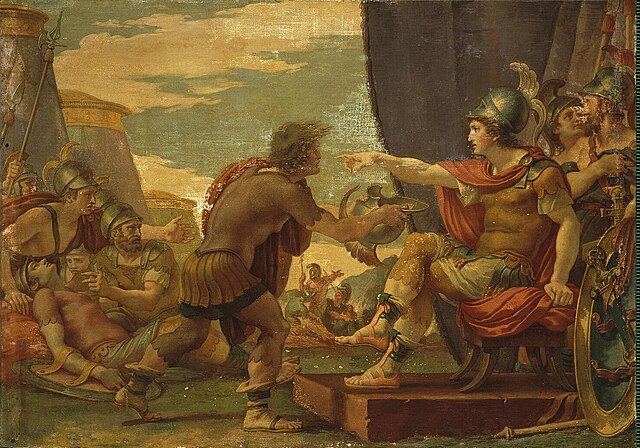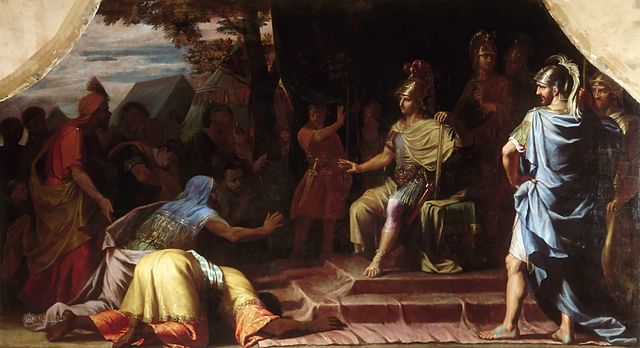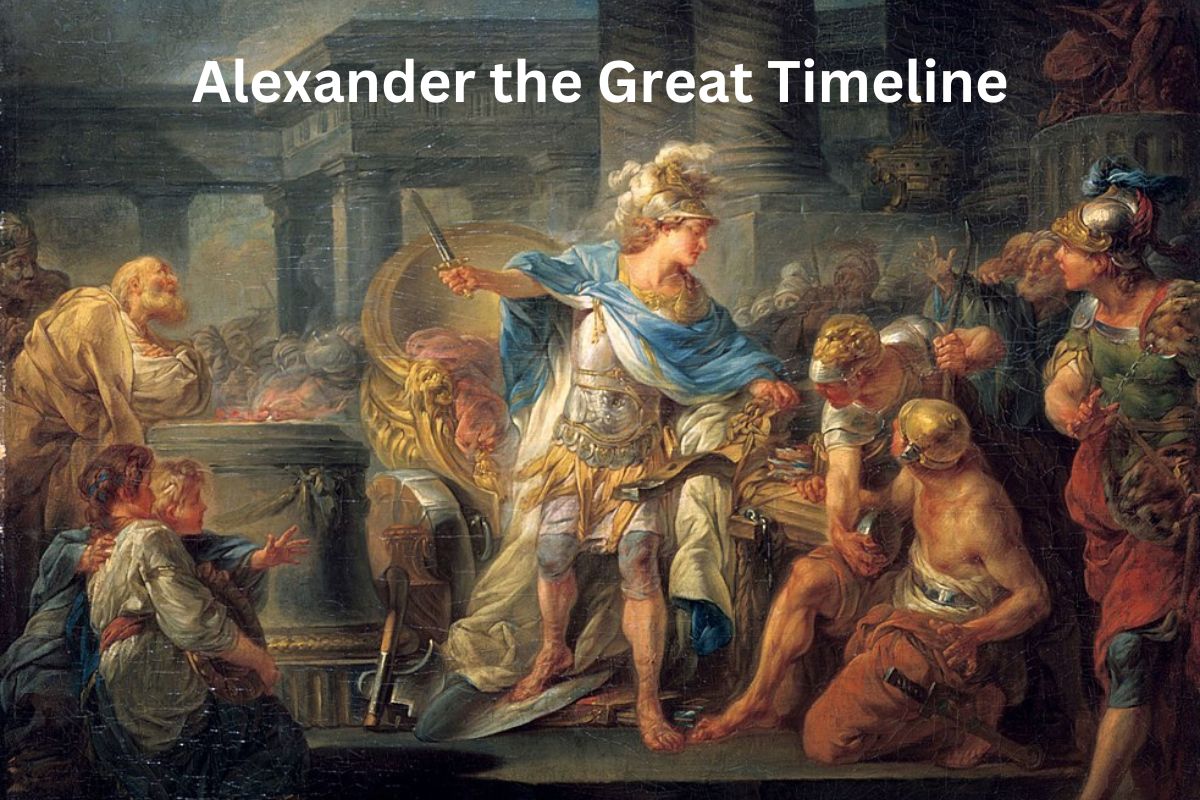Alexander III of Macedon, more commonly known as Alexander the Great (356–323 BC), was a king (basileus) of the ancient Greek kingdom of Macedon.
Born in Pella in 356 BC, Alexander was tutored by the philosopher Aristotle until the age of 16. He ascended to the throne in 336 BC after the assassination of his father, Philip II, and spent most of his ruling years on an unprecedented military campaign through Asia and northeast Africa.
By the age of thirty, he had created one of the largest empires of the ancient world, stretching from Greece to Egypt and as far east as India. He was undefeated in battle and is widely considered to be one of history’s most successful military commanders.
His strategies and campaigns are still studied in military academies today. Alexander died in Babylon in 323 BC at the age of 32, the causes of his death continue to be a subject of debate among historians.
| Year | Event |
|---|---|
| 356 BC | Alexander III of Macedon (Alexander the Great) is born in Pella. |
| 340 BC | Alexander is left in charge as regent of Macedonia and quells a Thracian rebellion. |
| 338 BC | Alexander fights alongside his father in the Battle of Chaeronea. |
| 336 BC | Alexander ascends to the throne of Macedonia after the assassination of his father. |
| 334 BC | Alexander embarks on his campaign against the Persian Empire and wins the Battle of Granicus. |
| 333 BC | Alexander defeats Darius III in the Battle of Issus. |
| 332 BC | Alexander captures Tyre, moves into Egypt, is named pharaoh, and founds Alexandria. |
| 331 BC | Alexander defeats Darius III at the Battle of Gaugamela and effectively conquers the Persian Empire. |
| 330 BC | Darius III is killed by his own generals; Alexander declares himself King of Persia. |
| 327 BC | Alexander begins his campaign in India. |
| 326 BC | Alexander wins a costly victory in the Battle of the Hydaspes, his last major battle. |
| 324 BC | Alexander’s companion, Hephaestion, dies, causing him great grief. |
| 323 BC | Alexander dies in Babylon, leading to the Wars of the Diadochi (Successors). His body is later interred in Alexandria, Egypt. |
Timeline of Alexander the Great
356 BC – Birth in Pella, Macedonia
Alexander III of Macedon, who would later be known as Alexander the Great, was born in the ancient capital of Macedonia, Pella. His parents were King Philip II and Queen Olympias.
Also Read: Facts About Alexander the Great
Alexander was raised as a royal, receiving education from tutors including the famous philosopher Aristotle, which heavily influenced his later interests in philosophy, science, and cultural amalgamation.

340 BC – Left as regent of Macedonia and suppresses a Thracian rebellion
When Alexander was 16, his father King Philip II embarked on a military campaign. During his absence, he appointed Alexander as regent, entrusting him with the management of the kingdom.
Also Read: Accomplishments of Alexander the Great
A tribe from Thrace (a region in Northern Greece) started a rebellion during this time, and Alexander demonstrated his military prowess by quelling this uprising successfully, proving his capabilities as a leader and a military strategist.
338 BC – Fights in the Battle of Chaeronea
This battle was a major clash between the forces of Philip II of Macedon and an alliance of Greek city-states including Athens and Thebes. Even though he was still very young, Alexander played a key role in this battle, leading the left wing of the Macedonian army.
His bravery and strategic ability were crucial in achieving victory, which cemented Macedonia’s position as the dominant state in Greece.
This battle demonstrated Alexander’s abilities as a military leader on a larger scale and was a significant step in his journey towards his future conquests.
336 BC – Ascends to the throne of Macedonia after his father’s assassination
After King Philip II was assassinated by one of his bodyguards, Alexander, aged 20, quickly ascended to the throne of Macedonia.
To consolidate his power, he executed potential rivals and repressed rebellions in regions such as Thrace, Thebes, and Athens.
The quick and efficient manner in which he handled this precarious situation demonstrated his shrewdness and tactical ability, vital characteristics for a king and military leader.
334 BC – Begins his campaign against the Persian Empire with the Battle of Granicus
Launching a massive campaign to topple the Persian Empire, Alexander led his troops across the Hellespont into Asia Minor (modern-day Turkey). The first significant confrontation, the Battle of Granicus, was against a large Persian force.
Despite being outnumbered, Alexander and his forces achieved a decisive victory, thanks to his innovative tactics and personal courage on the battlefield. This marked the beginning of his ambitious and largely successful conquest of Persia.

333 BC – Defeats Darius III at the Battle of Issus
Darius III, the King of Persia, met Alexander’s forces in the town of Issus, in what is now southern Turkey.
Despite being vastly outnumbered, Alexander’s tactical brilliance led the Macedonians to another resounding victory. Darius III fled, leaving his family behind, which Alexander reportedly treated with respect.
This battle was a significant turning point, as it marked the beginning of the end for the Persian Empire and confirmed Alexander’s reputation as a brilliant military strategist.
332 BC – Captures Tyre, becomes Pharaoh of Egypt, and founds Alexandria
After a grueling seven-month siege, Alexander captured the heavily fortified island city of Tyre, a significant Persian naval base. He then moved into Egypt, which welcomed him as a liberator from Persian rule. The Egyptians crowned him as Pharaoh, reinforcing his control over the territory.
While in Egypt, he founded the city of Alexandria, which would grow into a significant center of culture, trade, and learning in the ancient world. These actions further consolidated Alexander’s power, demonstrating his capacity for strategic planning, leadership, and vision.
331 BC – Defeats Darius III at the Battle of Gaugamela, conquering the Persian Empire
In this crucial battle, Alexander once again faced Darius III. Despite facing a much larger Persian army, Alexander and his forces were victorious, due largely to his superior tactics and the discipline of his troops. After this defeat, Darius III fled, effectively leaving the Persian Empire in Alexander’s hands.
330 BC – Darius III is killed, and Alexander declares himself King of Persia
After fleeing from the Battle of Gaugamela, Darius III was killed by one of his own satraps, Bessus. With Darius’s death, Alexander declared himself King of Persia and continued to consolidate his hold over the Persian territories.
He adopted many aspects of Persian culture and administration in an attempt to unify his vast, multicultural empire.
327 BC – Starts his campaign in India
Alexander’s ambition led him eastward into India, extending the boundaries of his empire further than ever before. His forces encountered strong resistance, including the formidable armies of the Indian kings.
326 BC – Wins a hard-fought victory in the Battle of the Hydaspes
In this battle, Alexander faced King Porus of the Paurava kingdom in the Punjab region (in modern-day Pakistan). Despite facing elephants and a fierce army, Alexander managed to win, but the heavy casualties shook the morale of his troops.
324 BC – His close friend Hephaestion dies
Hephaestion was Alexander’s closest friend, and some historical sources suggest he may have also been his lover. Hephaestion’s death in Ecbatana (modern-day Iran) caused Alexander immense grief.
He conducted extravagant funerals and rituals in his honor, and reportedly stopped the music in his empire for months.
323 BC – Dies in Babylon, leading to the Wars of the Diadochi. His body is later interred in Alexandria, Egypt
After a bout of heavy drinking and subsequent illness, Alexander died in Babylon at the age of 32. His sudden death caused a power vacuum in his vast empire, leading to the Wars of the Diadochi as his generals fought for control.
Despite his plans for succession, his empire was eventually divided among his generals, the “Diadochi,” into several successor kingdoms. Alexander’s body was later moved to Alexandria, Egypt, where it remained a significant site for many centuries.
